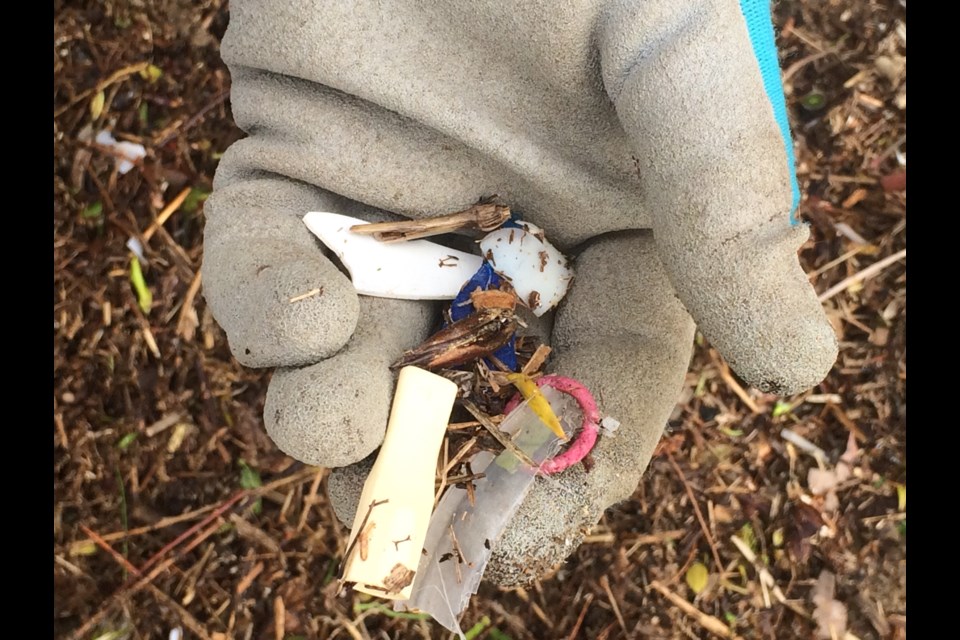A big blue converted school bus with the name Parley for the Oceans written on the side, was parked at the North Bay waterfront Monday night, signing up volunteers willing to help clean Marathon Beach.
Parley for the Oceans is an international organization based out of New York which works with other organizations to try and solve the plastic pollution crisis.
“Our mission is to get rid of plastic as it stands. We see plastic as a design failure. Plastic doesn’t break down in the natural world, it only breaks up into smaller particles that we like to refer to as microplastics,” said Nick Schippers.
“We go into communities and work with them through education and beach cleanups to engage them in the program. We use our model of AIR which stands for Avoid Intercept and Redesign to help communities think through the problem of plastic pollution as it stands.”
Roughly 20 volunteers took up the challenge.
“What we’re seeing here is tons of plastic pollution, things that have been out in the environment for an extended period of time. They’re washing up here on the shores of Marathon Beach,” said Schippers.
“Since we’re in a downwind location, it could be stuff from the other side of the lake, it could be remnants from the ice fishing season. We’re seeing a pretty big mix of stuff that is whole items that we can make out what they are, and stuff that is broken up into such small pieces we can’t tell what that item was to begin with.”
Volunteer Terry Thompson was surprised to be picking up a lot of small pieces of plastic.
“A lot of plastic ends off cigars. I can’t believe it. And water bottle caps. Those are the two main things I’ve seen. I didn’t realize there were so many small pieces of plastic here.”
Louise Sunstrum was busy digging through the top layer of sand for any pieces of plastic that may have been lodged below the surface.
“The storm seems to be bringing in a lot of small plastic debris like plastic coffee lids and ends off cigars which is surprising.”
Emily Macedo was unaware of how much plastic is scattered along the beach.
“It is quite scary to see how much there actually is. I actually was surprised when they said there was a beach cleanup because I knew there was one two weeks ago, and I thought there wouldn’t be that much, but now that I’m here, it is surprising how much is actually here,” said Macedo.
“We’re finding tons of straws, lids off plastic bottles, lots of disposable things. I’m hoping that the biggest thing we take away from this is that we’re conscious of our plastic use, how much we’re actually using and hopefully trying to reduce it. And of course, how we dispose of it.”
Hal Falk noted that not only is the plastic unsafe for animals, but also for the children who will soon be playing on the beach.
“The beach is not very clean with all this plastic here. It accumulates in the sand and it is hard to clean it out. I expected more large items, not so much fine stuff,” said Falk.
“That causes problems when kids play here. And the seagulls are here, and the plastic is probably small enough for them to pick up and inadvertently swallow which could cause problems with their intestines and could eventually kill them.”
Eight-year-old Kyle Samuel has a project of his own called Ban the Bag which focuses on plastic bag use in North Bay.
So, it was a natural fit for him to help rid the beach of plastic.
“I have been finding a lot of plastic. Throwing away plastic is just wrong. It is depressing. Do people care about animals? That’s what I want to know because plastic can kill animals.”
Parley is currently on its way to Tofino, British Columbia as part of a Canadian tour.
“Our goal is to host roughly 20 beach cleanups along the way, to get as many community members involved as possible,” said Schippers.
“During our stops we leave people with contacts for their local organizations like the North Bay Clean, Green and Beautiful group we partnered with at this stop, so that after we leave, they still have ways to activate and be involved in the solution to the problem.”
Everything collected from the beach will be sorted and catalogued.



